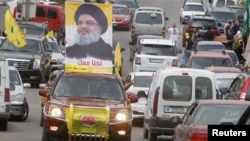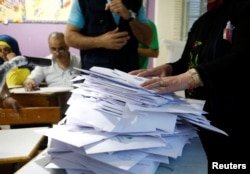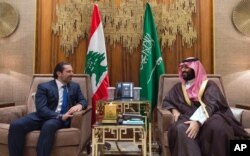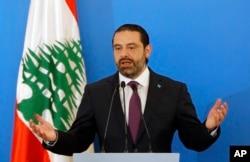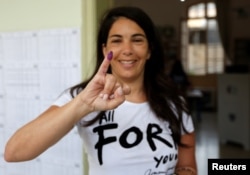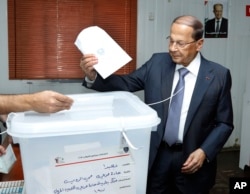The Iran-backed Hezbollah movement and its political allies appear to be on course, according to preliminary results and pollsters’ calculations, to win half the seats in Lebanon’s parliament from Sunday’s election — the country’s first parliamentary poll in almost a decade.
The still-to-be confirmed results show major gains for Hezbollah and its allies and seat losses for the Western-backed Future Movement of Prime Minister Saad Hariri.
Hezbollah’s gains will fuel anxiety in Gulf capitals and Washington about Tehran’s expanding political and military influence in the region, said analysts, just days before U.S. President Donald Trump is due to decide whether to keep the United States in the Iranian nuclear accord.
Lebanese Sunni allies of Hariri partly blamed Saudi Arabia on Monday for the Future Movement’s setbacks, arguing it had starved the Sunni bloc of funds in the run-up to the polls because of Riyadh’s growing frustration with Hezbollah’s tightening grip on Lebanon.
Saudi Arabia started to reduce its long-term support for Hariri when Crown Prince Mohammed bin Salman summoned him to Riyadh last November and ordered him to resign, after complaining Hariri had not done enough to confront Hezbollah.
“Hariri is going to be further weakened in any kind of government going forward,” said Andrew Tabler of the Washington Institute. “His ability to substantially tame or restrain Hezbollah is going to be very limited.”
Hezbollah, along with its political allies, secured at least 67 seats of the 128 in parliament, according to projections, while the Future Movement secured only 21. The pro-Hezbollah al-Akhbar newspaper Monday declared the election a “slap” for Hariri on its front page.
As results unfolded, Hariri said he extends his hand to all political groups who care about preserving Lebanon's stability.
The results will dismay not only Saudi Arabia. Civil society-based reformers in Lebanon had hoped a new voting system partly based on proportional representation and introduced for the election would herald a major political shake-up and start a breakup of Lebanon’s decades-old sectarian politics, which is based on a power-sharing arrangement involving the different religious elites.
On Sunday, many youngsters at polling stations said they hoped the election would mark the dawn of a new political era.
“We should vote for new people who are going to change," Hanin Terjman, a 21-year-old student, told reporters as she entered a polling station in the Lebanese capital, Beirut.
But thanks partly to strategic voting and alliance building, sometimes among sectarian foes in order to shut out newcomers, as well as low voter turnout, the old system appears to have emerged unscathed.
In Zahle, Lebanon’s third largest city, the predominantly Sunni Muslim Future Movement joined forces under one list with traditional political opponents, the Christian-Maronite Free Patriotic Movement, founded by the country’s president, Michel Aoun.
Elsewhere in the country, bizarre ‘collusive’ local lists were formed among traditional establishment foes to ensure the three main religious blocs of Shi’ites, Sunnis and Christians wouldn’t be disrupted too much by the new electoral law.
Turnout was 49.2 percent, down from 54 percent the last time legislative elections were held nine years ago. Many who stayed away from the polling stations said they remained unconvinced that anything would change.
According to early results, only two independent candidates appear to have been elected in Beirut.
Speaking on the eve of Sunday’s election, Paul Salem of the Middle East Institute, a Washington-based research institution, predicted that “just a handful of new lawmakers from civil society” would be elected to the 128-seat parliament. He added the election “won’t bring any fundamental change to the current governing arrangement” among President Aoun’s Christian bloc, Hariri’s Sunni-based Future Movement, and the Shi’ite alliance of Hezbollah and Amal.
The main party leaders will start in the coming days to negotiate the shape of a new government, but analysts said there likely will be no change with Hariri remaining as prime minister and Aoun staying on as president. But Hariri will be further constrained in what he can do by Hezbollah, said analysts, which will complicate Western policy toward Lebanon, a recipient of major U.S. and European aid.
Hariri has called for the formation of a new government to be agreed on quickly, saying that speedy reforms are needed to reduce state debt and persuade Western donors to release $11 billion in aid and soft loans that were pledged in April at a conference in Paris.
An Israeli minister Monday said the election outcome underlines for Israel that the Lebanese state is indistinguishable now from Hezbollah and that Israel shouldn’t distinguish between them in any future war.
“Hezbollah = Lebanon," Israeli Education Minister Naftali Bennett said on Twitter. “The State of Israel will not differentiate between the sovereign state of Lebanon and Hezbollah, and will view Lebanon as responsible for any action from within its territory.”




